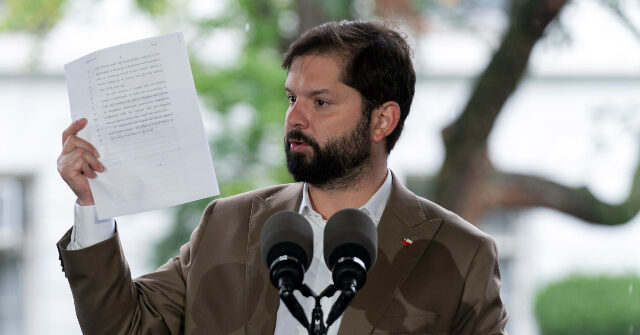Local prosecutors in Chile are currently investigating President Gabriel Boric following a criminal sexual harassment complaint lodged by an unidentified woman. The allegations reportedly stem from incidents that purportedly occurred between 2013 and 2014, during which the woman claims Boric disseminated private images and engaged in sexual harassment. Boric’s lawyer, Jonatan Valenzuela, has publicly denied the accusations, describing them as unfounded and alleging instead that the president is the victim of a long-standing harassment campaign orchestrated by the woman involved. This situation adds to the challenges facing Boric’s administration, which is currently embroiled in a major scandal involving other members of the government.
According to the recent statements from Valenzuela, the complaint, which was made public late Monday, stemmed from events that occurred when Boric was a 27-year-old law student in the city of Punta Arenas, his hometown. The specifics of the complaint involve not only claims of harassment but also allegations that Boric disseminated private images, a charge Valenzuela claims is inaccurate. He insists that the allegations are linked to a series of emails sent by the woman to Boric years ago, some of which included explicit content. Valenzuela cast the woman in the role of the aggressor, asserting that the president had never communicated with her after July 2014, thus disputing the basis for her accusations.
The investigation is still in its preliminary stages and has not been officially formalized, according to the regional prosecutor, Cristián Crisosto. Despite the ongoing inquiries, the prosecutor emphasized the importance of confidentiality, stating that the investigations would be conducted with respect to privacy and discretion. This comment underscores the serious nature of the allegations and the sensitivity of the situation. Valenzuela responded to Crisosto’s announcement with a morning press conference, reiterating that the claims against Boric were entirely baseless and that evidence of the alleged harassment from the woman had been submitted to the Prosecutor’s Office for review.
Reports in Chilean media suggest that the woman sent Boric explicit photos during their time as students, alongside messages professing her love for him and a desire for a relationship. This information further complicates the narrative, potentially framing the situation as one characterized more by mutual interest rather than harassment, thereby questioning the validity of her claims. Moreover, these developments occur against a backdrop of ongoing controversy within the Chilean government, particularly following the arrest of former Undersecretary of the Interior Manuel Monsalve on rape charges, which has raised serious questions about the administration’s handling of sexual misconduct accusations.
The decision to make the complaint public was apparently influenced by the timing of the Monsalve scandal, as sources within the Chilean government revealed that transparency was necessary given the rising scrutiny surrounding the administration. In this climate, the Boric administration finds itself challenged by simultaneous allegations of misconduct, which may affect its reputation and stability. The contrast between Boric’s denial of the harassment claims and the serious nature of the allegations is likely to pose a significant hurdle for his presidency, particularly in light of the broader societal discussions surrounding sexual harassment and accountability.
As the investigation unfolds, it could have far-reaching implications not only for Boric but also for the integrity of his government amidst the numerous allegations of misconduct against officials within his cabinet. The case has captured public interest, reflecting broader themes of power dynamics, consent, and accountability in political contexts. Critics and supporters alike will likely be watching closely what evidence will come to light and how it will affect Boric’s leadership as he navigates these turbulent waters. The situation reflects ongoing societal debates about sexual harassment and the challenges faced by those in power when confronted with allegations of wrongdoing. Ultimately, as the inquiry progresses, it will be imperative for all involved to ensure that justice is served, whatever the outcome may be.

